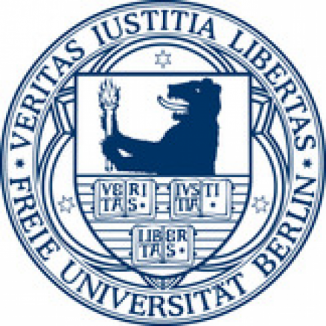Veritas – truth – is the highest aim of the research and teaching activities pursued at Freie Universität. In the modern sense, this focus on truth means outlining a clear interest in new findings and insight for the university’s academic activities, protecting those activities from the risk of arbitrariness, and observing the standards of good academic practice. It is in the quest for truth that academia finds the core of its intellectual self-image, its methodological sustainability, and its internal drive and dynamism.
Justitia – justice – refers to the university’s alignment to a generally acknowledged canon of values led by personal commitment and social responsibility. The term also stands in no small measure for an academic education that is open to young people from all over the world – regardless of social status, sex, national origin, religion, creed, or ethnicity.
Libertas – freedom – is the basic prerequisite for research and teaching activities to be successful. Only if academia determines its own goals and responsibilities, independently of external influences – whether from the state, the church, the business sector, or the wider society – can it meet its standards of achieving new knowledge with social consciousness.
As important as each of the university’s three guiding principles is on its own, the interaction between them is also fundamental. Truth without freedom becomes rigid dogma; justice without truth, an empty norm; and freedom without justice, a game with nothing at stake. Only where truth, justice, and freedom come together as values to form a greater whole is there space for intellectual commonality and open discourse in an unrestricted interchange of ideas.
Freie Universität believes its role is to provide exactly that kind of space for ideas and its guiding principles to resonate – a place that brings together innovations, researchers and students, concepts and ideas.
The years 1968, 1990, and 2007 mark turning points in the history of Freie Universität. The university was one of the central sites in Germany for the student protests of the 1960s, a movement that sparked a trend toward greater openness, equality, and democracy.
Then, after German reunification in 1990, Freie Universität Berlin shifted its emphasis, increasing its research activities. The number of graduates, successful doctoral candidates, and publications also grew by a significant measure. The basis for the university’s successful new approach was a series of fundamental reforms, including the introduction of modern management structures in the university’s administration, reorganization of the departments, and use of funding to support specific aims.
In 2007, Freie Universität Berlin was selected in the Excellence Initiative jointly sponsored by the German federal government and the governments of the federal states. It was one of nine universities in Germany to receive distinction in all three lines of funding, a step that has enabled the university to solidify and further expand its position as an “international network university.” In 2012 during the second funding round of the Excellence Initiative, it was selected again and is now one of eleven universities of excellence in Germany.

